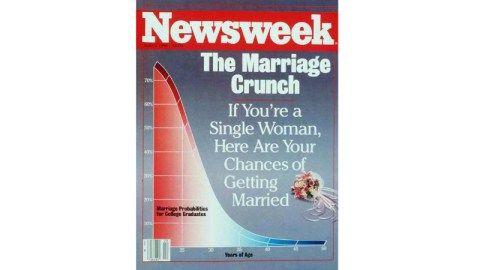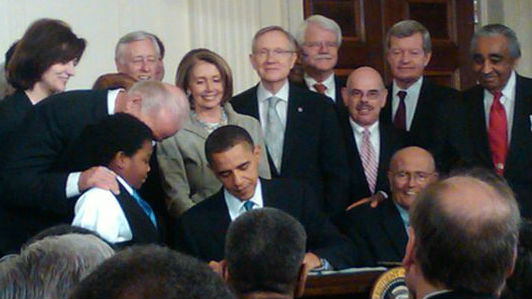Twenty-Six Years Later, What Happened to the “Marriage Crunch” Generation of Women?

Newsweek magazine in 1986 stunned a generation of college-educated single women by reporting that they had a better chance of being killed by a terrorist than ever walking down an aisle clutching a bouquet of flowers. Those women are now in their late 60s. Would you like to know how they did?
The June 2, 1986 cover of Newsweek magazine cover carried the headline “The Marriage Crunch: If you are a single woman here are your chances of ever getting married.” Accompanying this eye-catching headline was a graph that illustrated the bad news for women who had spent their youth in a classroom when they should have been busy finding themselves a husband – their chance of now marrying was shockingly low.
The report warned that a college-educated woman who was still single when she turned 30 had an only 20% chance that she would ever marry. If she hadn’t married her Prince Charming by the age of 35, the chance she ever would fell to 5%. If, heaven forbid, a woman was still single at age 40, well the probability was incredibly small (although probably significantly more likely than being killed by a terrorist).
The fact that the article forecast that the probability of a single 25-year-old college-educated woman ever marrying was only 50%, in a period in which over 90% of women married at some point in their life, should have been everyone’s first clue that there was something horribly wrong with these predictions.
Thanks to the passage of time, and the availability of U.S. Census data, I can tell you now how many of these college-educated women who had dared to postpone marriage into their 30s and their 40s fared on the marriage market in the years following this publication.
By 2010, 75% of college-educated women who were exactly 30 years old and single in 1986 had married at some point in the intervening 24 years. 69% of women who were exactly 35 and single in 1986 married their Prince Charming and even the old maids, the women who were 40 at the time that Newsweek made these dire predictions, were more likely than not to marry before their 65th birthdays – 68% married.
If you are a woman over 40 and single I am willing to bet you have heard the line “more likely to be killed by a terrorist” over and over again. And I wonder how many women’s lives were affected by willingness of society to accept these ridiculous predictions.
How many women, for example, rushed into bad marriages for fear of being left on the shelf? Or under-invested in education for fear that the cost of a college degree was the lost opportunity to have a family?
Personally, I keep a postcard size picture of the Newsweek cover pinned above my desk as a constant reminder of the power of statistical evidence to distort public perceptions in a way that is potentially damaging. And for what purpose, to sell a few extra magazines?





